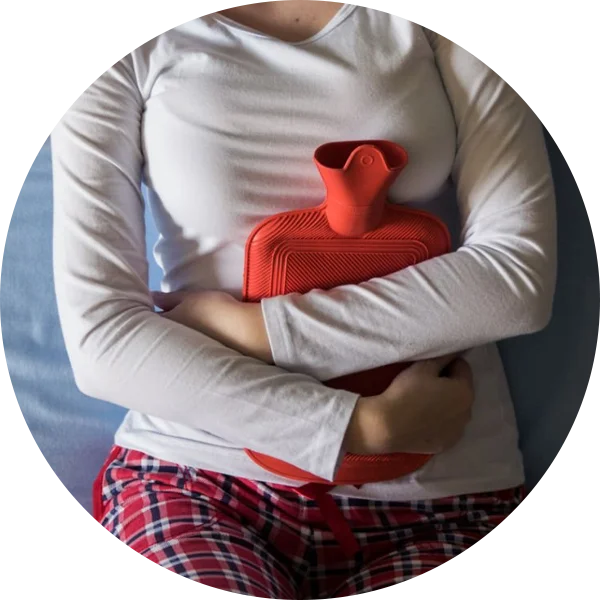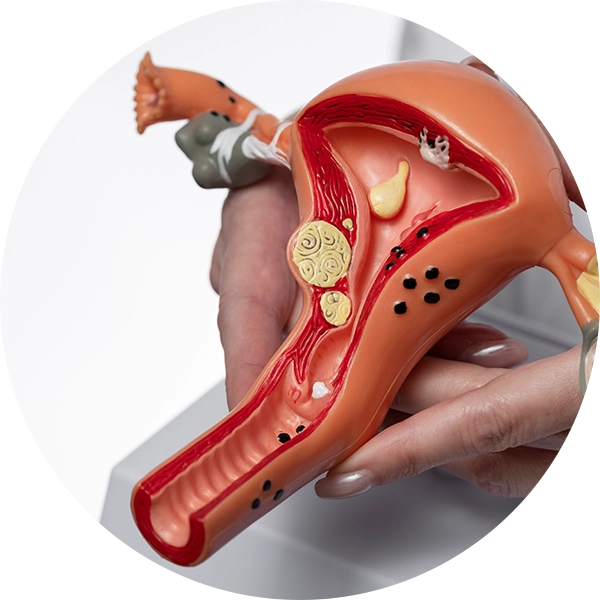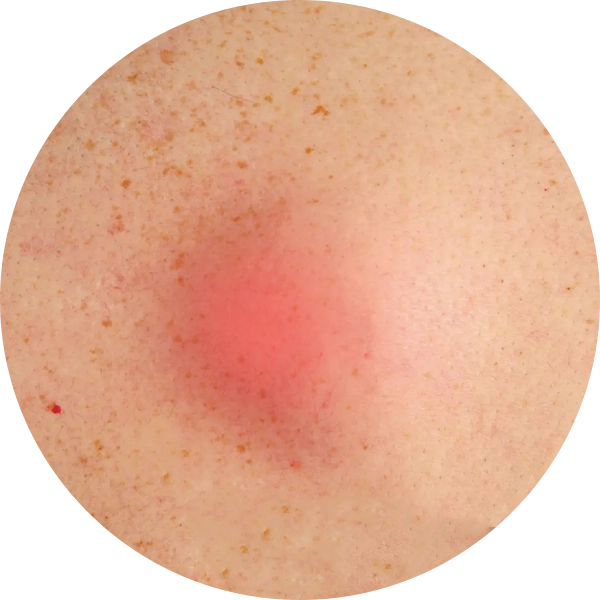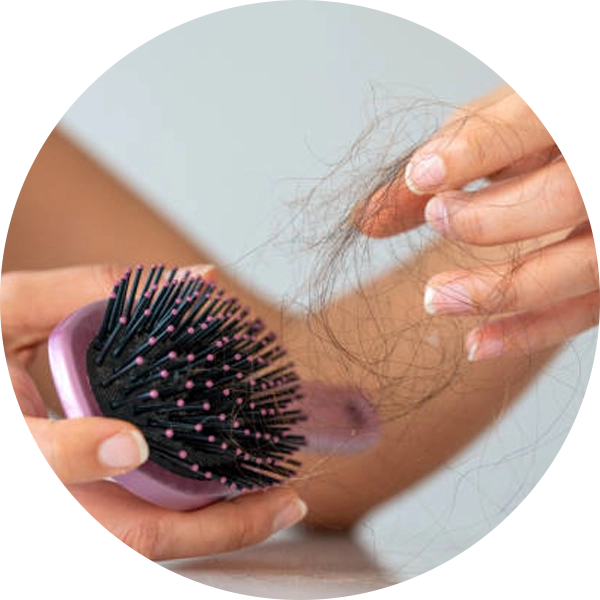Polycystic Ovarian Disease (PCOD) is a common hormonal disorder affecting women of reproductive age. It is primarily characterized by the development of multiple small cysts on the ovaries. This condition is marked by an imbalance in hormones, leading to issues with egg maturation and ovulation. PCOD is generally considered to be more common and less severe than PCOS, and its symptoms are often more directly related to menstrual and ovarian function.
In Ayurveda, PCOD is understood as a complex imbalance, primarily driven by the accumulation of Kapha dosha. This condition is often referred to as Avarana Janya Artava Dushti, which translates to “menstrual disorders caused by an obstruction.”
The core Ayurvedic principle at play is Avarana, or obstruction. Here, the heavy, slow, and dense qualities of excess Kapha dosha block the normal, free-flowing movement of Vata dosha. This Vata is responsible for the natural rhythm of menstruation and the maturation of the eggs. When its path is obstructed at the level of the ovaries, it leads to the stagnation of fluids and the formation of cysts.


Regular consumption of heavy, oily, sweet, and cold foods leads to an increase in Kapha dosha.

A sluggish metabolism and weak digestive fire lead to the formation of Ama (toxins).

This Ama, along with excess Kapha, accumulates in the reproductive channels, leading to the formation of fluid-filled cysts.

Lack of physical activity further slows metabolism and promotes the accumulation of Kapha and Ama.

Irregular Menstruation

Cyst Formation

Mild Weight Gain

Acne and Oily Skin

Hair Changes





First, an unhealthy lifestyle leads to an increase in Kapha dosha and a weakening of the digestive fire.
This causes the formation of toxins (Ama), which then accumulate in the body.
The excess Kapha and Ama obstruct the channels that nourish the reproductive system.
This obstruction blocks the movement of Vata dosha, which is responsible for the egg maturation and release from the ovaries.
This blockage at the ovarian level leads to the accumulation of fluid, resulting in the formation of cysts and irregular menstrual cycles.
We begin with a detailed evaluation combining modern diagnostic tools with Ayurvedic assessments such as Prakriti (body constitution), Vikriti (current imbalance), dosha mapping, and lifestyle review. This dual lens helps us see the full picture of your health, beyond just the symptoms.
Ayurveda teaches us that diseases are born from underlying imbalances; not just isolated issues. We carefully study dietary habits, digestion (Agni), toxin accumulation (Ama), stress, and daily routines to uncover the true root cause of your condition.
No two patients are alike. Your treatment is tailored to your unique body type (Vata, Pitta, Kapha), disease stage, and co-existing conditions. This ensures maximum effectiveness and safety, while restoring balance at the deepest level.
Healing isn’t one-dimensional. Based on your needs, we combine:
This integrated approach ensures that body, mind, and spirit heal together.
Health doesn’t end with treatment. We equip you with home remedies, seasonal routines, lifestyle practices, and follow-up support to prevent relapse and help you sustain wellness for the long term.
Ayurvedic treatment for PCOD focuses on addressing the root cause by pacifying Kapha, improving metabolism, and clearing the obstructed channels.

Warm, cooked, and light foods. Include bitter and pungent vegetables like bitter gourd, spinach, and fenugreek. Incorporate spices like turmeric, ginger, and cinnamon, which improve insulin sensitivity.

Cold, heavy, and processed foods. Limit dairy products, refined sugars, white flour, and fried foods. Avoid excessive intake of sweet and sour fruits.
| Do's | Don'ts |
|---|---|
Maintain a Regular Schedule: Go to bed and wake up at the same time. | Avoid Sedentary Lifestyle: Engage in regular physical activity. |
Manage Stress: Practice meditation and mindfulness. | Don’t Suppress Emotions: Express your feelings in a healthy way. |
Eat Regular Meals: Avoid skipping meals to maintain stable blood sugar. | Avoid Excessive Coffee and Alcohol: These can disrupt hormonal balance. |
Stay Hydrated: Drink warm water throughout the day. | Avoid Processed and Packaged Foods: They are high in sugar and unhealthy fats. |
Poses like Surya Namaskar (Sun Salutation) help in overall body circulation and hormonal balance. Bhujangasana (Cobra Pose) and Chakki Chalanasana (Grinding Mill Pose) are particularly beneficial for stimulating the reproductive organs.
Bhramari (Humming Bee Breath) and Nadi Shodhana (Alternate Nostril Breathing) are excellent for calming the nervous system and managing stress.

In Ayurveda, PCOD is understood as a complex imbalance, primarily driven by the accumulation of Kapha dosha. This condition is often referred to as Avarana Janya Artava Dushti, which translates to “menstrual disorders caused by an obstruction.”
The core Ayurvedic principle at play is Avarana, or obstruction. Here, the heavy, slow, and dense qualities of excess Kapha dosha block the normal, free-flowing movement of Vata dosha. This Vata is responsible for the natural rhythm of menstruation and the maturation of the eggs. When its path is obstructed at the level of the ovaries, it leads to the stagnation of fluids and the formation of cysts.

Irregular Menstruation

Cyst Formation

Mild Weight Gain

Acne and Oily Skin

Hair Changes
This is one of the most common and important questions that our patients ask us to clarify.
It may be possible to significantly improve blood sugar control, reduce symptoms, and support metabolic balance through the right combination of:
For some patients with a history of diabetes, this may mean reducing medication dependency.
For others, it may mean preventing complications and stabilising long-term health.
Every body is different, every outcome is different and our healing process respects that.


Regular consumption of heavy, oily, sweet, and cold foods leads to an increase in Kapha dosha.

A sluggish metabolism and weak digestive fire lead to the formation of Ama (toxins).

This Ama, along with excess Kapha, accumulates in the reproductive channels, leading to the formation of fluid-filled cysts.

Lack of physical activity further slows metabolism and promotes the accumulation of Kapha and Ama.


If you have been recently diagnosed as diabetic or if you have been managing diabetes with medications and other alternate forms of treatment, you can seek support. It’s helpful to reach out especially if:
A structured approach to managing diabetes brings clarity and reduces stress.
Ayurveda views diabetes as a metabolic imbalance influenced by:
Rather than only focusing on blood sugar numbers, Ayurveda supports the whole system, including:
Treatment is personalised, not one-size-fits-all and includes:

We begin with a detailed evaluation combining modern diagnostic tools with Ayurvedic assessments such as Prakriti (body constitution), Vikriti (current imbalance), dosha mapping, and lifestyle review. This dual lens helps us see the full picture of your health, beyond just the symptoms.
Ayurveda teaches us that diseases are born from underlying imbalances; not just isolated issues. We carefully study dietary habits, digestion (Agni), toxin accumulation (Ama), stress, and daily routines to uncover the true root cause of your condition.
No two patients are alike. Your treatment is tailored to your unique body type (Vata, Pitta, Kapha), disease stage, and co-existing conditions. This ensures maximum effectiveness and safety, while restoring balance at the deepest level.
Healing isn’t one-dimensional. Based on your needs, we combine:
This integrated approach ensures that body, mind, and spirit heal together.
Health doesn’t end with treatment. We equip you with home remedies, seasonal routines, lifestyle practices, and follow-up support to prevent relapse and help you sustain wellness for the long term.
Ayurvedic treatment for PCOD focuses on addressing the root cause by pacifying Kapha, improving metabolism, and clearing the obstructed channels.


